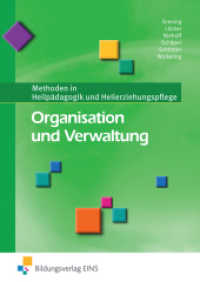Full Description
John McLeod's bestseller provides a comprehensive, research-informed overview of the theory and practice of counselling and psychotherapy. This new edition has been expanded to cover emerging aspects of contemporary practice, such as debates around neuroscience and integration; third-wave cognitive-behavioural therapies such as ACT, mindfulness and FAP; the experience of being a client; motivational interviewing; interpersonal psychotherapy; social dimensions of therapy; leaving therapy; gender and sexuality; spirituality; and key counselling and therapeutic skills and techniques.
This sixth edition has been fully updated and revised throughout and is separated into a four-part structure for easy navigation. Each chapter also enhances learning with the following resources:
• Case studies
• Landmark and contemporary research studies
• Topics for reflection and discussion
• Suggested further reading
An Introduction to Counselling and Psychotherapy has been the book of choice for students and tutors on introductory courses for over 25 years.
"Professor John McLeod's Introduction to Counselling and Psychotherapy is a classic text. In providing a comprehensive perspective on the field, it goes well beyond being a mere 'introduction'. Not only does it deliver an encyclopaedic amount of information, but it also presents this information in an incredibly captivating manner. There is simply no other book on the topic to match it. This new edition, truly faithful to its predecessors, maps new innovations in the context of previous generations' viewpoints. This is 'the' book on counselling and psychotherapy."
Ladislav Timulak, PhD, Course Director, Doctorate in Counselling Psychology, Trinity College Dublin
"John McLeod has a talent for bringing readers into intimate contact with the experience of another person's experience. Through his evocative descriptions, accessible language, and plentiful examples you will find yourself looking through the eyes of both clients and therapists and developing a depth of understanding about important processes in psychotherapy. His position at the vanguard of psychotherapy research allows him to bring to life the practice of psychotherapy while posing research questions and stimulating curiosity about findings. His valuing of varied approaches to psychotherapy invites the reader to connect with diverse perspectives and consider their own beliefs."
Heidi M. Levitt, PhD, University of Massachusetts Boston, USA
Contents
PART ONE: What happens in therapy: The common ground
1. What it's like to be a client
2. What it's like to be a therapist
3. Building a therapeutic relationship: Working together
4. The process of therapy: The beginning
5. The hard work: Choices, learning and change
6. Leaving therapy
PART TWO: Conceptualising the practice of therapy
7. The psychodynamic tradition
8. The cognitive-behavioural perspective
9. Interpersonal therapies
10. Person-centred, humanistic and experiential approaches
11. Transactional analysis: A comprehensive theoretical system
12. Gestalt therapy
13. Existential therapy
14. Narrative approaches to therapy
15. Working with families
16. The use of art in therapy
17. Therapy in nature: Using the outdoor environment
18. Religion and spirituality
19. Embodied conversations: Implications of developmental neuroscience and other biologically informed perspectives
20. Integrative therapies
21. Pluralistic therapy
PART THREE: Therapy as a response to cultural difference and social adversity
22. The historical context of contemporary practice
23. Culturally sensitive therapy
24. Therapy and the social
25. Gender and sexuality
26. A social justice orientation: Therapy as political action
PART FOUR: Being a therapist
27. The qualities of effective therapists
28. Professional structures for supporting therapist competence
29. Working within an ethical and moral framework
30. Using research to inform practice
31. Making use of different delivery formats to enhance access and effectiveness
32. Looking ahead: Future challenges for the psychotherapeutic professions








